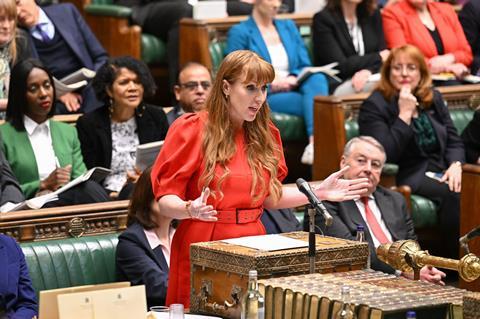When you work in Westminster, you get used to the high drama of parliamentary debate. But this should never be confused with petty name-calling and rudeness, says Sharmila Meadows. It may be culturally acceptable, but it isn’t to God

During the last Prime Minister’s Questions (PMQs), which the deputy PM, Oliver Dowden, and deputy Labour leader, Angela Rayner, fielded for their respective party leaders, Rayner called the Prime Minister “a pint-sized loser”.
Her comment lit up social media, with many applauding her performance, wit and intelligence. Yet regardless of where you sit on the political spectrum, her choice of words should never prove an acceptable form of debate.
We can all slip into cultural banter that is far from the way of the kingdom
There is no doubt that our parliament is combative. From its layout to debating style, our democracy encourages confrontation that can, at times, collapse into the juvenile – a matter that many find disheartening. The Bible calls for us to speak with wisdom, kindness and gentleness; to respect and even love our enemies. Moments such as this week’s PMQs are a reminder that, as Christians (and as a society), we should be aiming higher.
High drama
During my career as a Westminster policy adviser and private secretary, I had the opportunity to sit in both chambers many times. I may be in the minority, but I happen to love the theatre of the UK Parliament, with its jostling and oral point-scoring, but I also believe that this can be done in a manner that is respectful and smart. To call a serving prime minister “a pint-sized loser” during parliamentary debate is neither of those things.
This Parliament played host to Wilberforce’s petitions to abolish slavery, staged the historic rivalry of Gladstone and Disraeli and the wartime eloquence of Churchill. Wednesday, by contrast, posed a moment of which we should not be proud.
We may not agree with someone, but that is not a licence to cast aside common decency or basic etiquette in how we speak to or about them. We can grapple with issues, however thorny and however passionate, in a way that is dignified, astute and mature.
Cultural conformity
What Rayner said was both disrespectful and unprofessional – not only to Rishi Sunak but to Parliament itself. The phrasing itself was striking because it was delivered at the despatch box, but it mirrors a wider culture where politicians are fair game for abuse. The fact that her remark has won plaudits should sadden us, whatever way we vote.
Somewhere along the way, society has conflated democracy with the freedom to be dismissive, rude and arrogant in political debate. Liz Truss’ resignation elicited trolling from social media participants who are ordinarily polite. Yet the Bible calls us to respect those in authority (Romans 13:1-7) and to pray for those who govern us (1 Timothy 2:1-2). To retain reverence for the office even if we disagree with its incumbent.
The Bible calls for us to speak with wisdom, kindness and gentleness; to respect and even love our enemies
Perhaps society’s loss of reverence for God has trickled down so that authority figures, especially politicians, are denied the courtesy we may be careful to deploy with others. This cannot be right and, as Christians, we can set a higher bar. We can ensure that whether in our written word, our conversations with colleagues or banter in the pub, we offer a distinct voice. That, like Jesus, we communicate an honourable counter-cultural narrative. That we stand apart, even when to do so means to remain silent.
A robust debate
This is not to say that we do not challenge where issues demand it – and indeed, both Jesus and our Parliamentary system demands that we do. I have noted first-hand how our democracy is enhanced - and better serves its citizens - where there is cogent and robust opposition. Nor does this mean that we cannot debate the important issues of the day, but we need to do so in a way that bears the hallmarks of Christ.
In his Sermon on the Mount, Jesus offers an intrinsically counter-cultural thesis (Matthew 5-7). He ushers in God’s upside down kingdom and through it, points us to a better way.
This election year is a chance for Christians to speak with a distinctive voice. It means we don’t climb onto the Rayner bandwagon - or any other narrative that may attract public acclaim but dishonour Jesus. If we do, who knows what a witness we might be?






































5 Readers' comments